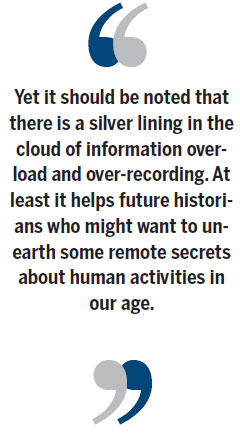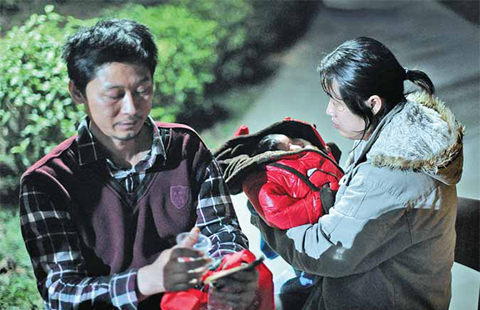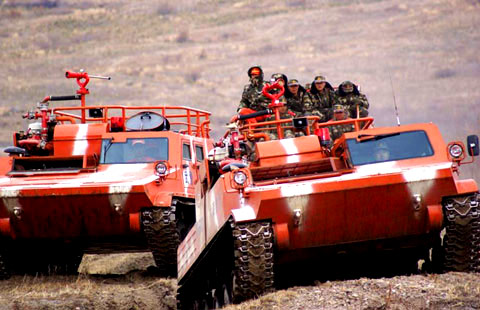Writing history in the age of the Internet
Updated: 2014-04-04 07:55
By Chen Yanru (China Daily Europe)
|
|||||||||||
Keen eye needed to sift through the wealth or waste of information, news and stories
Since its inception, the Internet has always been closely associated with the production, distribution and consumption of news. Journalism is often said to be history in a hurry, and the Internet has become one of the very first "gatekeepers" of information about events and people that might go down in history. Nothing is as old as yesterday's news, and so yesterday's news may already be tomorrow's history.
While historians have merely scratched the surface of the topic by making references to the Internet as a source of historical research, there is little said about how the Internet will influence the way history is recorded in the future.
The rules and regulations governing the making and writing of history evolved, developed and matured in the age of the traditional media, especially print media. There was only a limited amount of information about events and opinions that could enter into the media record, which was considered by many scholars to be the initial draft of history. Of course there were other records, private or public, of all sorts. But the key feature of this pre-Internet history was that the distinction between the public and private spheres of "historical record" was clear, there was a clear line between what was written for the purpose of being read by others and what was meant to be strictly kept to oneself.
The media at any time knowingly or unknowingly put the spotlight on certain events and people, thus setting the "attention agenda" for the audience. This accounts for why historical scholarship in the age of the traditional media was far less diverse than it is today.

In this sense, the Internet has truly revolutionized and democratized the making and recording of history. According to scholars who advocate "citizen journalism", theoretically speaking everyone who can access the Internet in some way can be a virtual "journalist" publicizing at any moment the "news" that his or her whims dictate. Actually, this is an age of "over recording" and "over discussing", as social network sites go into laborious detail about the daily trifles of people's lives. If measured against the established criteria for history, is such information significant? Maybe, probably not, but in the Internet era it is competing for historians' attention with what is truly worth recording, researching, and writing.
In the early 1960s, the US historian Daniel Boorstin recognized the use and abuse of news-making and event-making, introducing the concept of "pseudo-events", events planned and staged for the purpose of being reported by the media. Nowadays, such events are taken for granted and even consciously manipulated and exploited for the purpose of generating more "events" to catch and keep the attention of the public already overfed with information. Hence, more and more seemingly useless and meaningless information on the Internet begets more and more information-centered "news events".
And the plurality of sources embraced by the Internet is challenging thoughtful historians more severely, asking them just what should go down in history.
If it is hard to make such a decision regarding the record of events, it is even more difficult to determine who should be the heroes and heroines of history. In the past, such figures were known and recorded for their achievements, regardless of whether or not they had obtained sufficient fame and gain to be successful by the worldly standards of today. But the rise and spread of the new media make it possible and plausible for numerous people who have not accomplished much to rise to fame overnight, and their fame may also bring them great wealth, making them "success stories". In other words, the boundary is blurred between heroes and celebrities, achievements and public attention.
It then takes a specially keen eye on the part of future historians to select and sift through the wealth or waste of information, news, and stories about people and events that supposedly "make history" and "start new epochs". Then hopefully they can generate objective, scientific, reasonable periodizations of history in all spheres of human life and make justifiable assessments of historical events and figures. Up to now human history has been "recorded" and "preserved" history. We are used to leaving out all that was left out of the historical record. Now virtually anything and anybody can be recorded and preserved in history.
Yet it should be noted that there is a silver lining in the cloud of information overload and over-recording. At least it helps future historians who might want to unearth some remote secrets about human activities in our age.
However, we should not underestimate the human ability to manipulate information and bias in written records. When we are tempted to think that all events and people are out in the open sphere, the danger is lurking around that skillful social actors may exploit this to project and present socially desirable images and selectively control public attention and mislead opinion. However, this issue is too complicated and must be left to future historians and scholars in other related disciplines.
How is history made? How is history recorded? How is history preserved? How is history to be written? We are more likely to do justice to history in the Internet age if we start pondering such questions.
The author is a professor with the School of Journalism & Communication at Xiamen University. The views do not necessarily reflect those of China Daily.
(China Daily European Weekly 04/04/2014 page13)
Today's Top News
Chinese ships continue hunt for MH370 signals
Xinjiang vows to stop extremism
Australia also detects suspicious pulse signal
Afghans vote amid Taliban scare
Hostages taken to Philippine island
Huawei and China Daily inks co-op
Pulse signal discovered
in MH370 hunt area
Challenges in search for MH370 'unprecedented'
Hot Topics
Lunar probe , China growth forecasts, Emission rules get tougher, China seen through 'colored lens', International board,
Editor's Picks

|

|

|

|

|

|





